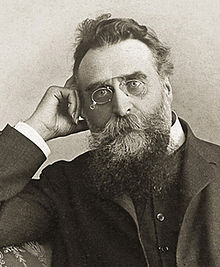Jonas Basanavičius
| Jonas Basanavičius Jan Basanowicz |
|
|---|---|

Jonas Basanavičius
|
|
| Born |
23 November 1851 Oszkobole, Congress Poland |
| Died | 16 February 1927 (aged 75) Vilnius, Second Polish Republic |
| Resting place |
Rasos Cemetery 54°40′9″N 25°18′10″E / 54.66917°N 25.30278°E |
| Nationality | Lithuanian |
| Citizenship | Russian Empire, Bulgaria, Poland |
| Alma mater | Moscow Medical Academy |
| Occupation | Physician |
| Known for | Publisher of Aušra, founder of the Lithuanian Scientific Society, signatory of the Act of Independence of Lithuania |
| Spouse(s) | Gabriela Eleonora Mohl |
| Parent(s) | Juras Basanavičius (1826–79) and Marė Birštoniūtė (1826–90) |
Jonas Basanavičius (![]() pronunciation , Polish: Jan Basanowicz; 23 November 1851 – 16 February 1927) was an activist and proponent of Lithuanian National Revival and founder of the first Lithuanian language newspaper Aušra. He was one of the initiators and the Chairman of the Organizing Committee of the 1905 Great Seimas of Vilnius. He was also the founder and chairman of the Lithuanian Scientific Society (1907). As a member of the Council of Lithuania, he was a signatory of the Act of Independence of Lithuania on February 16, 1918.
pronunciation , Polish: Jan Basanowicz; 23 November 1851 – 16 February 1927) was an activist and proponent of Lithuanian National Revival and founder of the first Lithuanian language newspaper Aušra. He was one of the initiators and the Chairman of the Organizing Committee of the 1905 Great Seimas of Vilnius. He was also the founder and chairman of the Lithuanian Scientific Society (1907). As a member of the Council of Lithuania, he was a signatory of the Act of Independence of Lithuania on February 16, 1918.
Basanavičius participated in every major event leading to the independent Lithuanian state and is often given the unique informal honorific title of the "Patriarch of the Nation" (Lithuanian: tautos patriarchas) for his contributions.
Basanavičius was born in the village of Ožkabaliai (Polish: Oszkobole) in the Augustów Governorate of Congress Poland, client state of the Russian Empire, to a family of Lithuanian farmers. Birth complications prompted his parents, devout Catholics, to pray and promise that they would educate their firstborn to be a priest. Keeping up with the promise, the parents supported a village tutor for local children. There Basanavičius learned basic reading, writing, and arithmetic as well as serving the altar. He further attended an elementary school in Lukšiai. During that time Polish was regarded as the more prestigious language of the nobility and well educated people. Russian was used in state administration, while Lithuanian was used among the peasants. After the Uprising of 1863, Tsarist authorities implemented various Russification policies in an attempt to reduce the influence of Polish language and culture. One of such policies allowed Basanavičius to attend Marijampolė Gymnasium. Before the uprising, a son of a Lithuanian could hardly expect to be admitted to a school catering to Polish nobility. Basanavičius failed his first entrance examinations in 1865, but succeeded a year later.
...
Wikipedia
